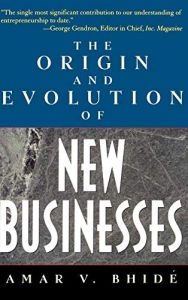Join getAbstract to access the summary!

Join getAbstract to access the summary!
Amar V. Bhide
The Origin and Evolution of New Businesses
Oxford UP, 2000
What's inside?
Successful entrepreneurs don't necessarily have to have unique ideas and long resumes, but they must be able to adapt quickly to changing business conditions and — for big profits — they must enter industries that are in a state of upheaval.
Recommendation
When Jann Wenner launched Rolling Stone magazine, he did no market research and considered himself merely an "amateur journalist." When Bill Gates and Paul Allen started Microsoft, they had no business plan, only a brainstorm that they should write a program in the BASIC computer language. Such seat-of-the pants planning is typical among entrepreneurs, says author Amar Bhide. Successful entrepreneurs don’t need unique ideas and long resumes, Bhide writes. Rather, they must be able to adapt quickly to changing business conditions, and they must enter industries in a state of upheaval, where established players are lacking. Bhide offers a revealing look at the characteristics that make for successful start-ups. In spite of his often-dense prose, Bhide gives plenty of real-world examples to illustrate his concepts. getAbstract recommends this book to entrepreneurs and to those thinking of starting their own companies.
Summary
About the Author
Amar V. Bhide is an associate professor at Harvard Business School. He is a former consultant at McKinsey & Co. and a former trader at E.F. Hutton. Bhide has a doctorate and MBA from Harvard Business School and a bachelor’s degree from the Indian Institute of Technology. His previous book is Of Politics and Economic Reality.

















Comment on this summary